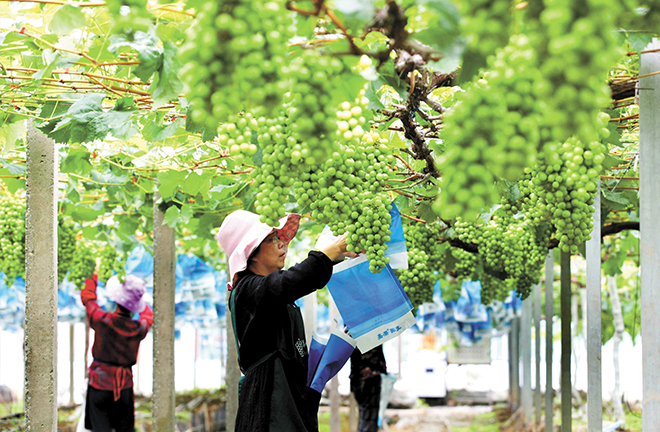Supporting scaled agricultural operations for common prosperity

Farmers bag grapes in Wenling City, Zhejiang Province. Photo: CFP
The No. 1 Central Document in 2022 once again focuses on rural areas, emphasizing the need to promote high-quality development and common prosperity through rural vitalization. The development of organizations for scaled agricultural operations is indispensable in achieving these goals.
The function of these organizations in high-quality development, and for common prosperity, makes it so that the government should guide and promote their development. However, in actual development, there are significant differences in the operational efficiency of these organizations with different business models. Among the multiple factors affecting their development, the supervision and management of hired labor is particularly critical.
Social transformation
With the process of urbanization and industrialization, there has been a massive exodus of rural labor, and it has caused a shortage of the labor necessary for agricultural production in rural households. This transition directly affects Chinese agriculture’s development, especially the relationship between households and agricultural service systems. When there is a shortage of agricultural labor in households, the agricultural service system expands from pre-production and post-production to mid-production, forming full coverage through pre-production, mid-production, and post-production.
The advancement of urbanization and industrialization has led to non-agriculturalization trends in the rural labor force, and there is an urgent need to cultivate new types of agribusiness and develop scaled operations to guarantee national food security. Meanwhile, in the new agricultural management system, small farmers are still the main entities responsible for agricultural operations, and small farmers and village societies constitute the organizational and social base for development of organizations for scaled agricultural operations.
Management characteristics
These organizations’ production is directly linked to hiring labor, which is oriented to capital accumulation and tends to expand and reproduce, mainly relying on land transfer and hiring labor for production.
After land is transferred in, organizations for scaled agricultural operations either contract out the land to “escrow” and provide pre-production and post-production services to vertically integrate operations, or horizontally integrate operations to achieve unified production. If an organization adopts a horizontal integration approach, it will directly intervene in the agricultural production process, supervise and manage the labor force it employs, directly affecting the performance of the organization.
From a sociological perspective, the employment relationship between the operating entity and hired labor is a type of labor cooperation relationship of action ethics. Analysis of this path naturally requires placing the employment relationship in a dual structure of market and rural society, examining how market logic and action ethics jointly shape the organization’s employment relationship.
The dual embeddedness of operations in organizations for scaled agricultural operations has complex implications for their internal governance. The sponsor of an organization allocates control within the organization according to the attributes of its own crops, and allocates the right to determine tasks, set incentives, inspect and accept, among itself, its “agents,” its “foremen,” and ordinary employees to its utmost optimization.
Common prosperity for all
Promoting common prosperity in scaled agricultural operations requires mutually beneficial development for both farmers and employers, especially supporting disadvantaged farmers by increasing their income, so that they can share the dividends of reform and development. The orderly employment relationship allows both parties to achieve mutual benefits and common prosperity. Based on the symbiotic interests of both parties, we can explore the optimization of internal governance mechanisms at the organizational operation level and improve internal control distribution mechanisms and incentive supervision mechanisms, and mechanisms for expressing and coordinating the interests of both parties, to avoid opportunism and conflicts of interests. By considering how to promote the tripartite cooperation among the government, the market, and villages/farmers by optimizing the policy system for agricultural benefits and promoting construction of primary-level rural organizations, we can prevent possible tensions from capital, placed on small farmers, and solve the problem of inefficient labor production faced by organizational operations, and enhance organizations’ ability to lead farmers towards prosperity.
Yang Liu is from the School of Literature, Law and Economics at Wuhan University of Science and Technology.
Edited by ZHAO YUAN

 PRINT
PRINT CLOSE
CLOSE